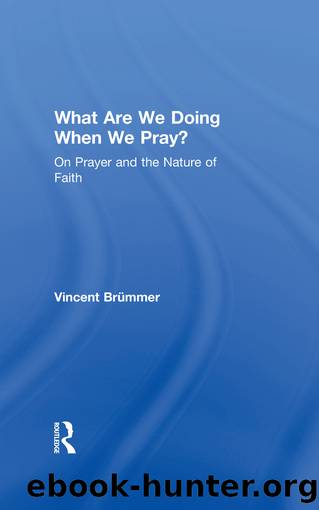What Are We Doing When We Pray? by Brümmer Vincent;

Author:Brümmer, Vincent;
Language: eng
Format: epub
Publisher: Taylor & Francis Group
It is clear that the practice of prayer is quite different in both form and purpose within each of these two forms of piety. In unitive mysticism prayer is either a preliminary step towards achieving ecstatic union with the Divine,14 or it is an expression of this ecstatic experience, as in the words of Tersteegen: 'I sink myself in Thee, I in Thee, Thou in me.'15 The latter usually develops into a wordless contemplation of the Divine. 'All [unitive] mystical prayer, therefore, tends to pass from prayer in words (either spoken aloud or inwardly framed) to wordless prayer, from speech with God to silent contemplation of God.... This wordless prayer is a state of prayer, not an act of prayer.'16 In personal mysticism, on the other hand, prayer is aimed at a personal relationship with God. and is understood as 'a living communion of the religious man with God, conceived as personal and present in experience, a communion which reflects the forms of the social relations of humanity'.17 This is so different from unitive mystical prayer that Heiler seems to doubt whether the latter could still strictly be termed 'prayer'. 'This ecstatic union with God can only be called prayer by the use of an inaccurate metaphor. In these cases of ecstasy there is no such consciousness of the difference between "I" and "Thou" as is essential to all prayer.'18
If, as we shall argue in this chapter, basic forms of prayer like petition, penitence and thanksgiving, all presuppose a personal relation with God. it is clear that within unitive mysticism they either become impossible or are turned into something very different. In the light of our argument in previous chapters, this is very clear in the case of petition. In unitive mysticism petition cannot be interpreted as impetratory. As Heiler points out. 'God is for the [unitive] mystic the supreme, changeless Reality whom man cannot influence by prayer even if he should pray for the highest moral blessings. The primitive conception of a real influence of man upon God lies at the root of the [personal] belief in the hearing of prayer.'19
Petition is related to personal relations in another way as well. Not only is a personal relationship between God and the petitioner a necessary condition for petitionary prayer, but petition is also a necessary condition for establishing personal relations, in the sense that no personal relation is possible unless both partners adopt the attitude towards one another which is expressed in petition. Since a personal relationship presupposes that both partners in the relation have the status of independent personal agents. I cannot succeed in establishing a personal relation with you if I do not both avow my own independent status as a person and also acknowledge your personal independence. This also applies to establishing a personal relationship with God.
If we could mechanically draw hint into an encounter, force him to meet us, simply because we have chosen this moment to meet him, there could be no relationship and no encounter.
Download
This site does not store any files on its server. We only index and link to content provided by other sites. Please contact the content providers to delete copyright contents if any and email us, we'll remove relevant links or contents immediately.
american english file 1 student book 3rd edition by Unknown(618)
Phoenicians among Others: Why Migrants Mattered in the Ancient Mediterranean by Denise Demetriou(613)
Verus Israel: Study of the Relations Between Christians and Jews in the Roman Empire, AD 135-425 by Marcel Simon(596)
Basic japanese A grammar and workbook by Unknown(586)
Caesar Rules: The Emperor in the Changing Roman World (c. 50 BC â AD 565) by Olivier Hekster(583)
Europe, Strategy and Armed Forces by Sven Biscop Jo Coelmont(525)
Give Me Liberty, Seventh Edition by Foner Eric & DuVal Kathleen & McGirr Lisa(502)
Banned in the U.S.A. : A Reference Guide to Book Censorship in Schools and Public Libraries by Herbert N. Foerstel(492)
The Roman World 44 BC-AD 180 by Martin Goodman(480)
Reading Colonial Japan by Mason Michele;Lee Helen;(472)
DS001-THE MAN OF BRONZE by J.R.A(471)
Introducing Christian Ethics by Samuel Wells and Ben Quash with Rebekah Eklund(470)
Imperial Rome AD 193 - 284 by Ando Clifford(459)
The Dangerous Life and Ideas of Diogenes the Cynic by Jean-Manuel Roubineau(459)
The Oxford History of World War II by Richard Overy(456)
Catiline by Henrik Ibsen--Delphi Classics (Illustrated) by Henrik Ibsen(448)
Language Hacking Mandarin by Benny Lewis & Dr. Licheng Gu(416)
Literary Mathematics by Michael Gavin;(411)
Brand by Henrik Ibsen--Delphi Classics (Illustrated) by Henrik Ibsen(406)
